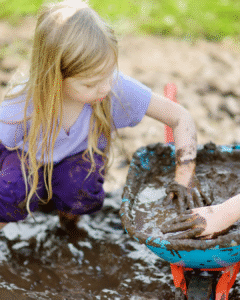Table of Contents
In today’s fast-paced, competitive world, the immense societal pressures on our kids to meet the expectations set by society, their parents, and even their peers, is over the top. From excelling academically to participating in numerous extracurricular activities, children are constantly pushed to achieve more, leaving little time for the simple joys of being a kid. It’s crucial that we, as parents, educators, and community members, take a step back to reevaluate the impact of these pressures on our children’s lives. This blog post aims to explore the benefits of allowing children to be children, by focusing on their mental and emotional well-being, fostering creativity, and supporting their individuality.
As we delve into this important topic, we will examine the various societal pressures children face, discuss their impact on children’s development, and offer alternative approaches that prioritize the well-being and unique growth of each child. By embracing the freedom of childhood and letting our kids enjoy the journey at their own pace, we can help them flourish into happy, healthy, and well-rounded individuals.
Understanding Societal Pressures on our Kids
One of the primary societal pressures children face today is rooted in academic expectations. High-stakes testing and standardized exams place immense pressure on children to perform well, often causing undue stress. Moreover, the constant push to achieve top grades and the emphasis on early academic achievements can make children feel as if their worth is solely defined by their performance in school. Additionally, comparisons with peers and siblings can exacerbate these pressures, leading to unhealthy competition and further eroding a child’s self-esteem.
Another source of societal pressure on children stems from their involvement in extracurricular activities. The over-scheduling of activities can lead to a hectic and stressful lifestyle, with children struggling to find a balance between academics and their hobbies. The pursuit of well-roundedness for college applications further intensifies this pressure, as children feel compelled to excel in sports, arts, or other areas to stand out. Consequently, this leaves them with limited time for free play and relaxation, depriving them of the opportunity to simply enjoy their childhood and recharge.
Social norms and peer pressure also contribute to the societal pressures faced by children. The pervasive influence of social media on self-image and self-worth can negatively affect children’s perception of themselves, leading to feelings of inadequacy. Additionally, the desire to fit in with peers and adhere to social expectations creates pressure to conform, often at the expense of their individuality. Children may also face the pressure to conform to gender roles and stereotypes, limiting their ability to express their authentic selves. Furthermore, the fear of missing out and the need to keep up with trends can cause children to prioritize external validation over their own interests and well-being.
Parental expectations and comparisons can also play a significant role in adding to the societal pressures experienced by children. At times, parents may project their unfulfilled dreams and ambitions onto their children, expecting them to fulfill these aspirations. This can result in pressure to follow a particular career or education path that may not align with the child’s own interests or passions. Parents might also compare their children to siblings, cousins, or friends, leading to feelings of inadequacy and self-doubt. Additionally, placing an emphasis on external achievements over personal growth and happiness can create an unhealthy environment that hinders a child’s overall development and well-being.
In today’s world, children are faced with various pressures that often stem from academic expectations, extracurricular activities, social norms, and parental expectations. High-stakes testing and the pursuit of top grades can create a stressful academic environment, while the over-scheduling of activities leaves little time for relaxation and free play. Additionally, social media and peer pressure can negatively impact a child’s self-image, and parental comparisons can foster unhealthy competition. Understanding these pressures is essential in identifying ways to alleviate them and promote a more balanced approach to childhood development.

The Impact of Societal Pressures on Children
A. Stress and Anxiety
Societal pressures can lead to increased stress and anxiety for children, as they face the burden of constant achievement and performance. The fear of failure or disappointing parents and teachers can have a significant impact on their mental health and coping mechanisms. Over time, this chronic stress can result in long-term effects, such as increased rates of anxiety disorders and depression among children.
B. Burnout and Mental Health Concerns
The constant pressure to excel can also lead to burnout, characterized by emotional exhaustion, loss of motivation, and disengagement from activities they once enjoyed. Chronic stress can have physical health consequences as well, such as sleep deprivation and a weakened immune system. Additionally, children experiencing burnout may be at an increased risk of resorting to substance abuse or engaging in self-destructive behaviors as coping mechanisms.
C. Loss of Creativity and Playtime
Societal pressures can also contribute to a significant loss of creativity and playtime for children. The reduction in unstructured, imaginative play limits opportunities for self-expression and exploration, stifling their natural curiosity and innovative thinking. As a result, children may become overly focused on structured, achievement-oriented activities, neglecting the importance of play in their overall development.
D. Hindered Emotional Development
Lastly, societal pressures can hinder children’s emotional development, making it difficult for them to develop healthy coping mechanisms and emotional resilience. The constant need to meet expectations can lead to the neglect of essential emotional intelligence and empathy skills. Children may suppress their genuine emotions to conform to societal norms, which can strain relationships with parents, siblings, and peers. By addressing these pressures, we can create a more supportive environment that fosters children’s emotional well-being and allows them to grow into emotionally healthy adults.
Societal pressures on children can have profound effects on their mental and emotional well-being. Persistent stress and anxiety can lead to burnout, negatively impacting children’s motivation and overall mental health. The loss of creativity and playtime in a child’s life may stifle their natural curiosity and limit opportunities for self-expression. Furthermore, the pressures to conform and achieve can hinder emotional development, impeding the growth of emotional intelligence and healthy coping mechanisms. Recognizing these consequences is crucial for parents and educators to take appropriate steps to support children in a more balanced and nurturing environment.
The Benefits of Letting Children Be Children
A. Enhanced Creativity and Imagination
Allowing children to embrace their childhood without excessive societal pressures fosters enhanced creativity and imagination. Unstructured playtime encourages innovative thinking, while providing the freedom to explore and experiment without fear of failure. Through play and self-expression, children develop problem-solving skills and are more likely to embrace divergent thinking and unique perspectives.
B. Improved Mental Health and Well-being
By reducing societal pressures, children can experience improved mental health and well-being. Stress and anxiety levels decrease, while the risk of burnout and depression is significantly lowered. This environment also supports the development of self-awareness and mindfulness, promoting a healthy work-life balance from an early age.
C. Stronger Emotional Intelligence
Children who are allowed to simply be children can develop stronger emotional intelligence. They are more likely to grow in empathy and understanding of others’ emotions, and have an enhanced ability to regulate and express their emotions in a healthy way. Through emotional experiences, they build resilience and coping mechanisms, which can lead to strengthened relationships with peers, family, and educators.
D. Development of Essential Life Skills through Unstructured Play
Unstructured play is a crucial component of childhood that allows children to develop essential life skills. Through play, children cultivate social skills and teamwork, learn time management and self-regulation abilities, and become more adaptable and flexible in various situations. Furthermore, the freedom to explore and play encourages the growth of self-confidence and independence, equipping children with the tools they need to navigate life successfully.
Letting children be children and providing them with the freedom to explore, play, and express themselves can lead to numerous benefits. Enhanced creativity and imagination are cultivated through unstructured playtime, allowing children to develop problem-solving skills and unique perspectives. Improved mental health and well-being result from reduced stress levels, while stronger emotional intelligence is fostered through empathy and emotional experiences. Furthermore, essential life skills such as social skills, time management, and adaptability are developed through unstructured play. By nurturing a more balanced and holistic environment, children can grow into well-rounded, emotionally intelligent individuals capable of thriving in various aspects of life.
Strategies for Reducing Societal Pressures on Children
A. Prioritizing Mental Health and Well-being
To reduce societal pressures on children, it’s essential to prioritize their mental health and well-being. Encourage open communication about feelings and emotions, validate their emotions, and offer support. Provide resources for stress management and self-care, and seek professional help when necessary to ensure children have the tools they need to cope with challenges.
B. Emphasizing the Importance of Play and Downtime
Make time for unstructured, creative play to help children develop holistically. Strive to achieve a balance between structured activities and relaxation, allowing them to explore hobbies and interests without pressure. Recognize the value of play for healthy development and promote its importance in fostering essential life skills.
C. Encouraging Self-Discovery and Personal Interests
Support children’s unique passions and talents by avoiding comparisons and fostering individuality. Allow them to set their own goals and aspirations, and celebrate their personal achievements, both big and small. This approach nurtures their sense of self and enables them to develop a strong foundation for personal growth.
D. Supporting Individuality and Unique Development Paths
Respect each child’s pace and learning style, and encourage a growth mindset that embraces challenges as opportunities for growth. Acknowledge that success looks different for everyone, and promote autonomy by helping children develop decision-making skills. By supporting individuality and unique development paths, we can empower children to reach their full potential, unburdened by societal pressures.
To reduce the impact of societal pressures on children, several strategies can be implemented by parents, educators, and communities. Prioritizing mental health and well-being involves encouraging open communication, offering support, and seeking professional help when necessary. Emphasizing the importance of play and downtime allows children to engage in unstructured activities and relax, promoting healthy development. Encouraging self-discovery and personal interests involves supporting children’s unique passions and talents while fostering individuality. Lastly, supporting individuality and unique development paths means respecting each child’s pace and learning style, promoting autonomy and decision-making skills. Implementing these strategies can help create a nurturing environment that empowers children to thrive as individuals, free from the burdens of societal pressures.

Real life Examples
A. Case Studies of Children Who Thrived Without Societal Pressures
Exploring the lives of children raised in alternative educational environments, such as Montessori or Waldorf schools, can offer valuable insights into the benefits of reduced societal pressures. These schools prioritize individuality, creativity, and emotional well-being, often resulting in well-rounded, happy children. Additionally, the stories of successful individuals who followed unconventional paths, such as entrepreneurs, artists, or activists, can serve as inspiration for embracing a less structured approach to childhood.
B. Lessons Learned from Alternative Educational Approaches
Alternative educational approaches, such as homeschooling or unschooling, can provide valuable lessons on the importance of nurturing a child’s unique interests and abilities. These methods often emphasize hands-on learning, exploration, and self-guided discovery, allowing children to develop essential life skills and a love for learning without the pressures of traditional schooling.
C. Inspirational Stories of Creative and Emotionally Intelligent Children
Sharing stories of creative and emotionally intelligent children who have made an impact in their communities can inspire others to reassess societal pressures. These children may have developed innovative solutions to problems, demonstrated exceptional empathy and kindness, or overcome personal challenges through resilience and determination. Their stories can serve as powerful reminders that a child’s potential is not solely defined by academic achievements or societal expectations.
By examining real-life examples and success stories, we can learn from the experiences of those who have thrived without societal pressures. These examples can serve as inspiration for parents, educators, and communities to adopt a more holistic approach to childhood development, prioritizing individuality, creativity, and emotional well-being.
One notable example of a successful individual who thrived without traditional societal pressures is the renowned Swedish climate activist, Greta Thunberg. Diagnosed with Asperger’s syndrome, obsessive-compulsive disorder (OCD), and selective mutism, Greta faced challenges in her early years within conventional educational systems.
However, her parents recognized her passion for environmental issues and provided her with the necessary support and encouragement to pursue her interests. Greta started her climate activism at the age of 15 by skipping school to protest outside the Swedish Parliament, demanding stronger action on climate change. Her efforts sparked a global movement known as “Fridays for Future,” inspiring millions of students worldwide to join her in raising awareness about the urgency of addressing climate change.
Greta’s story is a prime example of how embracing a child’s unique interests and abilities, rather than adhering to traditional societal expectations, can lead to remarkable achievements. Her success demonstrates the importance of fostering individuality, nurturing passions, and supporting children as they pave their own path in life.
Conclusion
In conclusion, embracing childhood freedom and releasing societal pressures on our children can lead to numerous benefits, including enhanced creativity, improved mental health, stronger emotional intelligence, and the development of essential life skills. By understanding the impact of these pressures and implementing strategies that prioritize mental health, play, self-discovery, and individuality, we can create a more nurturing environment for our children to grow and flourish.
Real-life examples and success stories serve as powerful reminders of the potential that lies within every child when they are given the space to explore their passions and forge their own path. As parents, educators, and communities, we must strive to redefine our expectations and support our children’s individuality, allowing them to enjoy the freedom of childhood and develop into happy, healthy, and well-rounded individuals.
Let us take this opportunity to reflect on our own expectations and practices, and commit to fostering a world where our children can thrive, unburdened by the weight of societal pressures. The future is in their hands, and it is our responsibility to provide them with the guidance and support they need to navigate it successfully.



